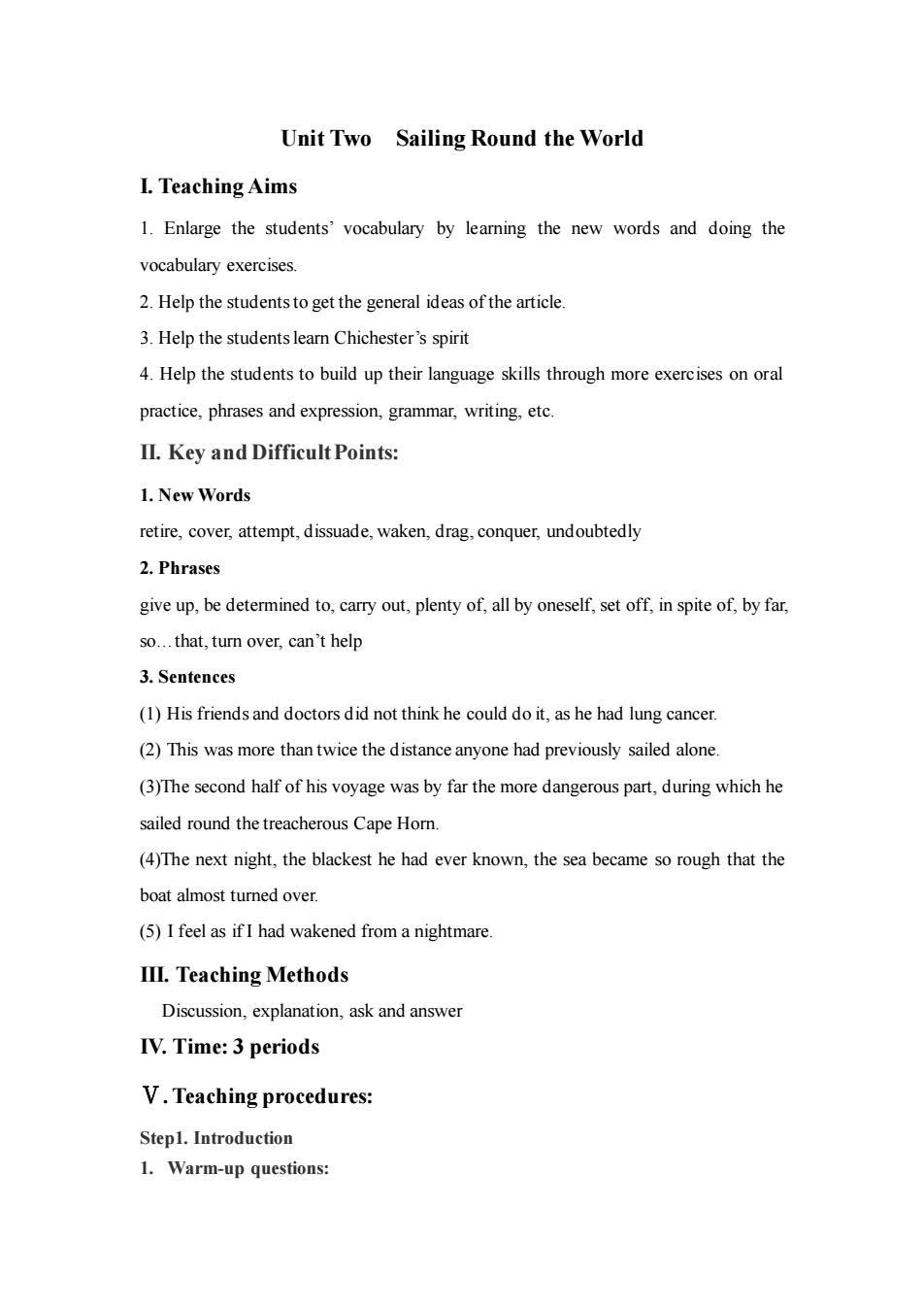
Unit Two Sailing Round the World I.Teaching Aims 1.Enlarge the students'vocabulary by learning the new words and doing the vocabulary exercises. 2.Help the studentsto get the general ideas ofthe article. 3.Help the studentsleam Chichester's spirit 4.Help the students to build up their language skills through more exercises on oral practice,phrases and expression,grammar,writing,etc. II.Key and Difficult Points: 1.New Words retire,cover,attempt,dissuade,waken,drag,conquer,undoubtedly 2.Phrases give up.be determined to.carry out.plenty of,all by oneself.set off,in spite of,by far so...that,turn over,can't help 3.Sentences (1)His friends and doctorsdid not think he could do it,as he had lung cancer. (2)This was more than twice the distance anyone had previously sailed alone (3)The second half of his voyage was by far the more dangerous part,during which he sailed round the treacherous Cape Hom. (4)The next night,the blackest he had ever known,the sea became so rough that the boat almost tumed over. (5)I feel as if I had wakened from a nightmare. III.Teaching Methods Discussion,explanation,ask and answer IV.Time:3 periods V.Teaching procedures: Step1.Introduction 1.Warm-up questions:
Unit Two Sailing Round the World I. Teaching Aims 1. Enlarge the students’ vocabulary by learning the new words and doing the vocabulary exercises. 2. Help the students to get the general ideas of the article. 3. Help the students learn Chichester’s spirit 4. Help the students to build up their language skills through more exercises on oral practice, phrases and expression, grammar, writing, etc. II. Key and Difficult Points: 1. New Words retire, cover, attempt, dissuade, waken, drag, conquer, undoubtedly 2. Phrases give up, be determined to, carry out, plenty of, all by oneself, set off, in spite of, by far, so…that, turn over, can’t help 3. Sentences (1) His friends and doctors did not think he could do it, as he had lung cancer. (2) This was more than twice the distance anyone had previously sailed alone. (3)The second half of his voyage was by far the more dangerous part, during which he sailed round the treacherous Cape Horn. (4)The next night, the blackest he had ever known, the sea became so rough that the boat almost turned over. (5) I feel as if I had wakened from a nightmare. III. Teaching Methods Discussion, explanation, ask and answer IV. Time: 3 periods Ⅴ. Teaching procedures: Step1. Introduction 1. Warm-up questions:

(1)What is your greatest dream? (2)Have you ever dreamed of sailing round the world? (3)If you could sail to any place in the world,where would you want to go?Why? (4)If you decided to sail round the world,what would you need to take with you in the boat? 2.Background Information (1)Sir Francis Chichester(1901-1972) Bom in Devon,Britain in 1901,Sir Francis Chichester was a British adventurer. In 1931,he planned to fly round the world,but the plane was damaged in Japan.In 1960.he won the first solo transatlantic race by sailing the"Gipsy Moth II During 1966-197 he sailed round the world alone in a 53-foot yacht the"Gipsy Moth IV He published two booksThe Lonely Sea and Sky"&"The Gipsy Moth Circles the World” (2)Sir Francis Drake(1543-1596)-English navigator and explorer Francis Drake was the first Englishman to sail round the world.After several slave trading expeditions to West Africa and the Spain Main(1566-1573),he sailed round theglobe(I577-l580)He managed to restrict the Spanish Armada(西班牙无敌舰队) by raiding Cadiz ()(1587).and helped to defeat(1588)the Spanish attempt to invade England. (3)Elizabeth II(1926-)-Queen of Great Britain and Northern Ireland Elizabeth II was the elder daughter and successor of George VI.At age 18 she was made a State Counselor ()On Nov.20,1947,she married Philip Mountbatten,duke (of Edinburgh.They were in Kenya when the king died(Feb. 6,l952)and Elizabeth succeeded to the throne(王座).Her coronation(加冕礼),on June2,1953,was the first to be televised (4)Elizabeth I(1533-1603)-Queen of England Elizabeth I was the queen of England(1558-1603),daughter of Henry VIII and Anne Boleyn.She was one of the most powerful rulers in the English history.The time when she reigned (is called the Elizabethan Age.and it was a long period of 45 years,when England became very rich and powerful.Abroad,it was an age of
(1) What is your greatest dream? (2) Have you ever dreamed of sailing round the world? (3) If you could sail to any place in the world, where would you want to go? Why? (4) If you decided to sail round the world, what would you need to take with you in the boat? 2. Background Information (1) Sir Francis Chichester (1901-1972) Born in Devon, Britain in 1901, Sir Francis Chichester was a British adventurer. In 1931, he planned to fly round the world, but the plane was damaged in Japan. In 1960, he won the first solo transatlantic race by sailing the “Gipsy Moth II”. During 1966-1967 he sailed round the world alone in a 53-foot yacht the “Gipsy Moth IV”. He published two books “The Lonely Sea and Sky” & “The Gipsy Moth Circles the World” (2) Sir Francis Drake (1543 - 1596) — English navigator and explorer Francis Drake was the first Englishman to sail round the world. After several slave trading expeditions to West Africa and the Spain Main (1566-1573), he sailed round the globe (1577-1580). He managed to restrict the Spanish Armada (西班牙无敌舰队) by raiding Cadiz (加地斯) (1587), and helped to defeat (1588) the Spanish attempt to invade England. (3) Elizabeth II (1926- ) — Queen of Great Britain and Northern Ireland Elizabeth II was the elder daughter and successor of George VI. At age 18 she was made a State Counselor (顾 问 ). On Nov. 20, 1947, she married Philip Mountbatten, duke (公爵) of Edinburgh. They were in Kenya when the king died (Feb. 6, 1952) and Elizabeth succeeded to the throne (王座). Her coronation (加冕礼), on June 2, 1953, was the first to be televised. (4) Elizabeth I (1533-1603 ) — Queen of England Elizabeth I was the queen of England (1558-1603), daughter of Henry VIII and Anne Boleyn. She was one of the most powerful rulers in the English history. The time when she reigned (在位) is called the Elizabethan Age, and it was a long period of 45 years, when England became very rich and powerful. Abroad, it was an age of
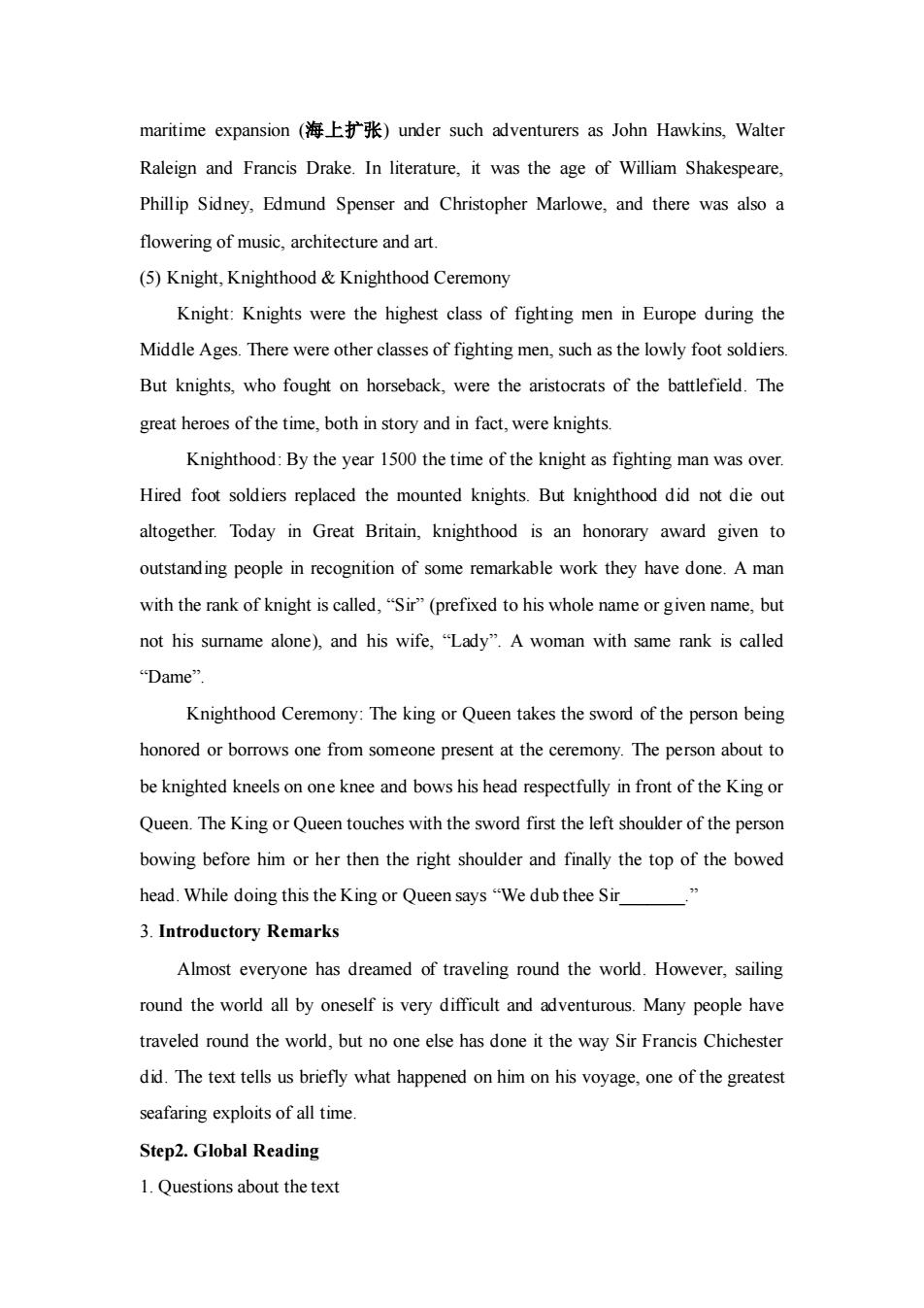
maritime expansion(海上扩张)under such adventurers as John Hawkins,.Walter Raleign and Francis Drake.In literature,it was the age of William Shakespeare, Phillip Sidney,Edmund Spenser and Christopher Marlowe,and there was also a flowering of music,architecture and art. (5)Knight,Knighthood&Knighthood Ceremony Knight:Knights were the highest class of fighting men in Europe during the Middle Ages.There were other classes of fighting men,such as the lowly foot soldiers But knights,who fought on horseback,were the aristocrats of the battlefield.The great heroes of the time,both in story and in fact,were knights. Knighthood:By the year 1500 the time of the knight as fighting man was over. Hired foot soldiers replaced the mounted knights.But knighthood did not die out altogether.Today in Great Britain,knighthood is an honorary award given to outstanding people in recognition of some remarkable work they have done.A man with the rank of knight is called,S(prefixed to his whole name or given name.but not his sumame alone),and his wife,"Lady".A woman with same rank is called "Dame" Knighthood Ceremony:The king or Queen takes the sword of the person being honored or borrows one from someone present at the ceremony.The person about to be knighted kneels on one knee and bows his head respectfully in front of the King or Queen.The King or Queen touches with the sword first the left shoulder of the person bowing before him or her then the right shoulder and finally the top of the bowed head.While doing this the King or Queen says"We dub thee Sir 3.Introductory Remarks Almost everyone has dreamed of traveling round the world.However.sailing round the world all by oneself is very difficult and adventurous.Many people have traveled round the world,but no one else has done it the way Sir Francis Chichester did.The text tells us briefly what happened on him on his voyage,one of the greatest seafaring exploits of all time Step2.Global Reading 1.Questions about the text
maritime expansion (海上扩张) under such adventurers as John Hawkins, Walter Raleign and Francis Drake. In literature, it was the age of William Shakespeare, Phillip Sidney, Edmund Spenser and Christopher Marlowe, and there was also a flowering of music, architecture and art. (5) Knight, Knighthood & Knighthood Ceremony Knight: Knights were the highest class of fighting men in Europe during the Middle Ages. There were other classes of fighting men, such as the lowly foot soldiers. But knights, who fought on horseback, were the aristocrats of the battlefield. The great heroes of the time, both in story and in fact, were knights. Knighthood: By the year 1500 the time of the knight as fighting man was over. Hired foot soldiers replaced the mounted knights. But knighthood did not die out altogether. Today in Great Britain, knighthood is an honorary award given to outstanding people in recognition of some remarkable work they have done. A man with the rank of knight is called, “Sir” (prefixed to his whole name or given name, but not his surname alone), and his wife, “Lady”. A woman with same rank is called “Dame”. Knighthood Ceremony: The king or Queen takes the sword of the person being honored or borrows one from someone present at the ceremony. The person about to be knighted kneels on one knee and bows his head respectfully in front of the King or Queen. The King or Queen touches with the sword first the left shoulder of the person bowing before him or her then the right shoulder and finally the top of the bowed head. While doing this the King or Queen says “We dub thee Sir_______.” 3. Introductory Remarks Almost everyone has dreamed of traveling round the world. However, sailing round the world all by oneself is very difficult and adventurous. Many people have traveled round the world, but no one else has done it the way Sir Francis Chichester did. The text tells us briefly what happened on him on his voyage, one of the greatest seafaring exploits of all time. Step2. Global Reading 1. Questions about the text

(1)What happened to Francis Chichester in 1931? (2)What route did Chichester follow in sailing round the world? ()How many miles did he cover on the first half of his voyage? (4)What did his friends in Sydney try to dissuade him from doing? (5)What happened to Chichester on the night of January 30? (6)How did he feel after sailing round Cape Hom?? (7)How was he received when he arrived back in England? (8)How many miles did the second half of the voyage cover? 2.Structure of the text Part I(para.1-2)Sir Francis Chichester was an ambitious man.He was determined to carry out his plan to sail round the world. Part II(para.3-8)The process of Francis Chichester's traveling. a.From England to Sydney b.From Sydney to England Part III(para.9)The significance of his great voyage-giving man new pride Step 3 Detailed Study 1.He gave up flying and began sailing. give up::stop doing or having(something)放弃 a.give someone else possession of something you have e.g.An old man gave up his seat on the bus to a lady witha baby. b.abandon hope for sth.or the attempt todosth.对..不抱希望 e.g.The boy gave up answering the question because it is too difficult. c.allow yourself or someone else to be caught by the police or enemy soldiers 投降 e.g.The criminal went to the police station to give himself up. d.devote one's time,life,etc.to把..耗费于 e.g Chichester gave himself up toa life of adventure
(1) What happened to Francis Chichester in 1931? (2) What route did Chichester follow in sailing round the world? (3) How many miles did he cover on the first half of his voyage? (4) What did his friends in Sydney try to dissuade him from doing? (5) What happened to Chichester on the night of January 30? (6) How did he feel after sailing round Cape Horn?? (7) How was he received when he arrived back in England? (8) How many miles did the second half of the voyage cover? 2. Structure of the text Part I (para.1-2) Sir Francis Chichester was an ambitious man. He was determined to carry out his plan to sail round the world. Part II (para.3-8) The process of Francis Chichester’s traveling. a. From England to Sydney b. From Sydney to England Part III (para.9) The significance of his great voyage — giving man new pride Step 3 Detailed Study 1. He gave up flying and began sailing. give up: stop doing or having (something) 放弃 a. give someone else possession of something you have 让给 e.g. An old man gave up his seat on the bus to a lady with a baby. b. abandon hope for sth. or the attempt to do sth. 对…不抱希望 e.g. The boy gave up answering the question because it is too difficult. c. allow yourself or someone else to be caught by the police or enemy soldiers 自首, 投降 e.g. The criminal went to the police station to give himself up. d. devote one’s time, life, etc. to 把…耗费于 e.g. Chichester gave himself up to a life of adventure

2.His friends and doctors did not think he could do it,as he had lung cancer. Grammar:Because,.since,as这三个词都可引导原因状语从句,其中because语 气最强,主要回答游why引出的问句,since次之,as最弱。Since和as表示的 原因多是既定事实。若从句表示的原因还不是确切的事实,就不能用sice。在 强调句式中,若强调原因状语从句,只能用because引导的从句。 It was because he was ill that he didn't go with us. Fo引导的是并列分句,它只是对前面的分句加以解释,说明推断的理由,并且 只能后置。 e.g.It must have rained last night,for the ground is wet this morning. 3.But Chichester wasdetermined to carry out his plan be determined todo/about doingsth:have a strong will to(do)决心做 e.g.He is determined about giving up smoking. CF:be determined to do sth.make up one's mind to do sth be determined to dosth.侧重某人的决心. make up one's mind to do sth.则强调某人打定主意,不再动摇 e.g.We are determined to devote ourselves tojust causes. At last we made up our minds to tell her the truth. 4. ...an age when many men retire, retire:vi. a.give up one's job because of old age退休 e.g.Professors usually retire at 60 in China b.go away;:withdraw离开 e.g.After the dinner,the ladies retired to the drawing room,leaving the men to their cigars and drinks. c.go to bed睡觉 e.g.The writer usually retires at midnight. 5.But the clippers had had plenty of crew.Chichester did it all by himself,.. (1)plenty of:(followed by either a countable and an uncountable noun)a large quantity or number of许多 e.g.plenty of water/sugar/money/time
2. His friends and doctors did not think he could do it, as he had lung cancer. Grammar:Because, since, as 这三个词都可引导原因状语从句,其中 because 语 气最强,主要回答游 why 引出的问句,since 次之,as 最弱。Since 和 as 表示的 原因多是既定事实。若从句表示的原因还不是确切的事实,就不能用 since。在 强调句式中,若强调原因状语从句,只能用 because 引导的从句。 It was because he was ill that he didn’t go with us. For 引导的是并列分句,它只是对前面的分句加以解释,说明推断的理由,并且 只能后置。 e.g. It must have rained last night, for the ground is wet this morning. 3. But Chichester was determined to carry out his plan. be determined to do / about doing sth.: have a strong will to (do) 决心做 e.g. He is determined about giving up smoking. CF: be determined to do sth. & make up one’s mind to do sth. be determined to do sth. 侧重某人的决心。 make up one’s mind to do sth. 则强调某人打定主意,不再动摇。 e.g. We are determined to devote ourselves to just causes. At last we made up our minds to tell her the truth. 4. …, an age when many men retire,… retire: vi. a. give up one’s job because of old age 退休 e.g. Professors usually retire at 60 in China. b. go away; withdraw 离开 e.g. After the dinner, the ladies retired to the drawing room, leaving the men to their cigars and drinks. c. go to bed 睡觉 e.g. The writer usually retires at midnight. 5. But the clippers had had plenty of crew. Chichester did it all by himself, … (1) plenty of: (followed by either a countable and an uncountable noun) a large quantity or number of 许多 e.g. plenty of water/sugar/money/time
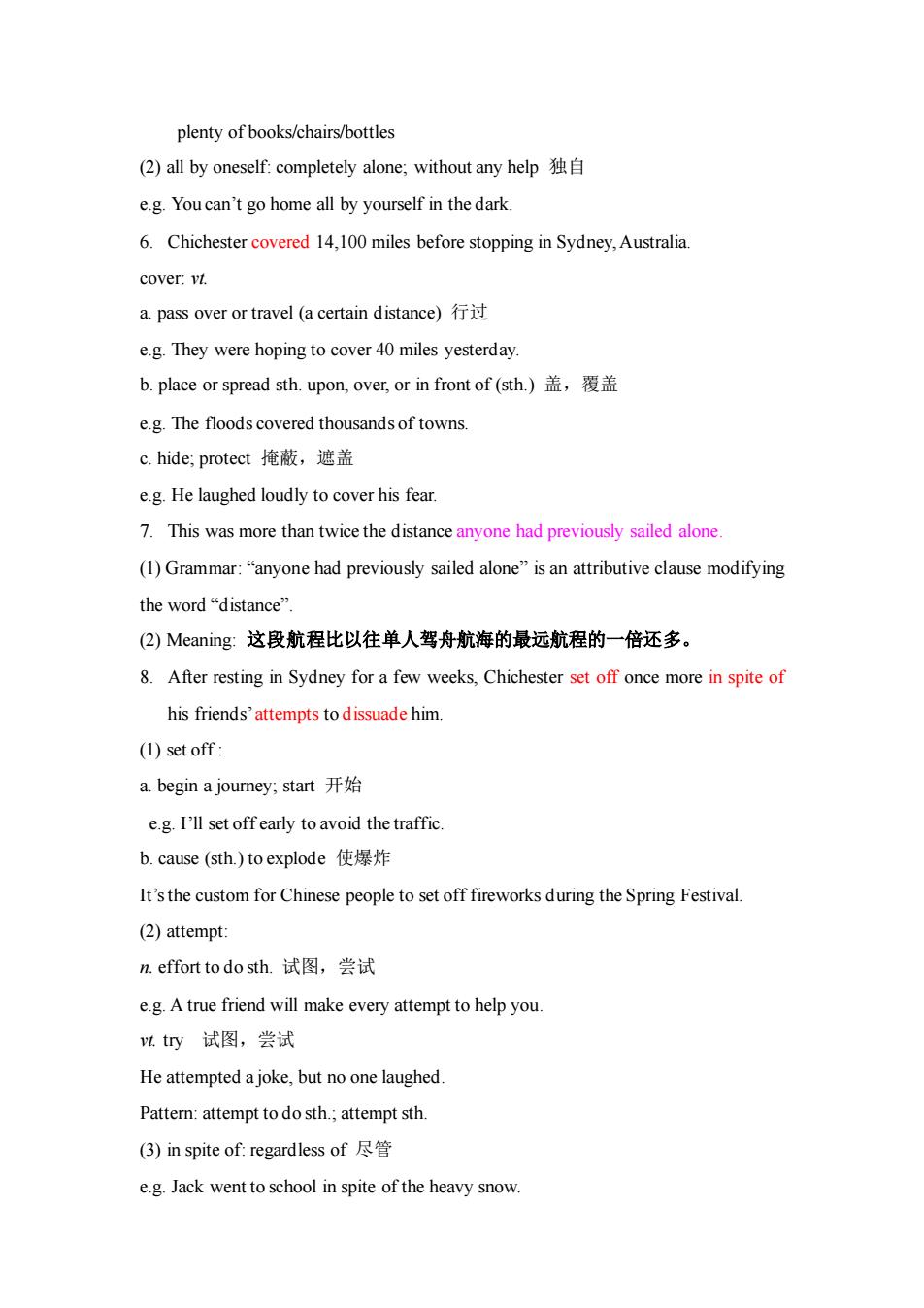
plenty of books/chairs/bottles (2)all by oneself:completely alone;without any help e.g.You can't go home all by yourself in the dark 6.Chichester covered 14,100 miles before stopping in Sydney,Australia. cover:vt. a.pass over or travel(a certain distance)行过 e.g.They were hoping to cover 40 miles yesterday. b.place or spread sth.upon,over,or in front of(sth.)盖,覆盖 e.g.The floods covered thousands of towns. c.hide:protect掩蔽,遮盖 e.g.He laughed loudly to cover his fear. 7.This was more than twice the distance anyone had previously sailed alone. (1Grammar:"anyone had previously sailed alone"is an attributive clause modifying the word“distance”. (2)Meaning:这段航程比以往单人驾舟航海的最远航程的一倍还多。 8.After resting in Sydney for a few weeks,Chichester set off once more in spite of his friends'attempts todissuade him (1)set off a.begin a joumey;start开始 e.g.I'll set offearly to avoid the traffic. b.cause(sth.)toexplode使爆炸 It's the custom for Chinese people to set off fireworks during the Spring Festival (2)attempt: n.effort to dosth..试图,尝试 e.g.A true friend will make every attempt to help you. 以ty试图,尝试 He attempted a joke,but no one laughed. Patter:attempt to dosth.;attempt sth (3)in spite of:regardless of尽管 e.g.Jack went to school in spite of the heavy snow
plenty of books/chairs/bottles (2) all by oneself: completely alone; without any help 独自 e.g. You can’t go home all by yourself in the dark. 6. Chichester covered 14,100 miles before stopping in Sydney, Australia. cover: vt. a. pass over or travel (a certain distance) 行过 e.g. They were hoping to cover 40 miles yesterday. b. place or spread sth. upon, over, or in front of (sth.) 盖,覆盖 e.g. The floods covered thousands of towns. c. hide; protect 掩蔽,遮盖 e.g. He laughed loudly to cover his fear. 7. This was more than twice the distance anyone had previously sailed alone. (1) Grammar: “anyone had previously sailed alone” is an attributive clause modifying the word “distance”. (2) Meaning: 这段航程比以往单人驾舟航海的最远航程的一倍还多。 8. After resting in Sydney for a few weeks, Chichester set off once more in spite of his friends’attempts to dissuade him. (1) set off : a. begin a journey; start 开始 e.g. I’ll set off early to avoid the traffic. b. cause (sth.) to explode 使爆炸 It’s the custom for Chinese people to set off fireworks during the Spring Festival. (2) attempt: n. effort to do sth. 试图,尝试 e.g. A true friend will make every attempt to help you. vt. try 试图,尝试 He attempted a joke, but no one laughed. Pattern: attempt to do sth.; attempt sth. (3) in spite of: regardless of 尽管 e.g. Jack went to school in spite of the heavy snow

in spite of和despite两者意义相同,后面均跟名词,可以互换。但是,despite本 身是介词,不能与of连用。 e.g.We had a wonderful holiday in spite of/despite the weather. (4)dissuadesb(from doing sth)prevent sb.from doing sth.by giving reasons e.g.They dissuaded her from leaving school. 9.The second half of his voyage was by far the more dangerous part,during which he sailed round the treacherous Cape Hom (1)by far.by a large degree (usually used to modify a superlative or comparative degree adj..or adv.)得多 e.g.She is by far better than Jim at spelling He is by far the best boy in the class. (2)Grammar:during which是介词加关系代词的情况,which指代“The second half of his voyage" 10.The next night.the blackest he had ever known,the sea became so rough that the boat almost turned over. (I)so...that:to/in such a degree that(the adv.clause of result)如此.…以至于 e.g.Was he so angry that he hit her? She ran so fast that we couldn't catch up with her (2)turn over. a.(cause to)fall over,upset(使)转身,翻转 e.g.The nurse tumed the patient over and gave him an injection b.give the control of sth.tosb.移交 e.g.She tumed over the work to her assistant and had a talk with us. c.think over认真思考 e.g.Itumned the idea over(in my mind)for a week before replying. (3)Structure:Here "the blackest he had ever known"is in apposition to "The next night'”. 11.Still,he could not help thinking that if anything should happen,the nearest person he could contact by radio.unless there was a ship nearby,would be on an island 885 miles away
in spite of 和 despite 两者意义相同,后面均跟名词,可以互换。但是,despite 本 身是介词,不能与 of 连用。 e.g. We had a wonderful holiday in spite of / despite the weather. (4) dissuade sb (from doing sth): prevent sb. from doing sth. by giving reasons 劝阻 e.g. They dissuaded her from leaving school. 9. The second half of his voyage was by far the more dangerous part, during which he sailed round the treacherous Cape Horn. (1) by far: by a large degree (usually used to modify a superlative or comparative degree adj. or adv. ) …得多 e.g. She is by far better than Jim at spelling. He is by far the best boy in the class. (2) Grammar: during which 是介词加关系代词的情况,which 指代“The second half of his voyage” 10. The next night, the blackest he had ever known, the sea became so rough that the boat almost turned over. (1) so…that: to/ in such a degree that ( the adv. clause of result) 如此…以至于 e.g. Was he so angry that he hit her? She ran so fast that we couldn’t catch up with her. (2) turn over: a. (cause to ) fall over; upset (使)转身,翻转 e.g. The nurse turned the patient over and gave him an injection. b. give the control of sth. to sb. 移交 e.g. She turned over the work to her assistant and had a talk with us. c. think over 认真思考 e.g. I turned the idea over (in my mind) for a week before replying. (3) Structure: Here “the blackest he had ever known” is in apposition to “The next night”. 11. Still, he could not help thinking that if anything should happen, the nearest person he could contact by radio, unless there was a ship nearby, would be on an island 885 miles away
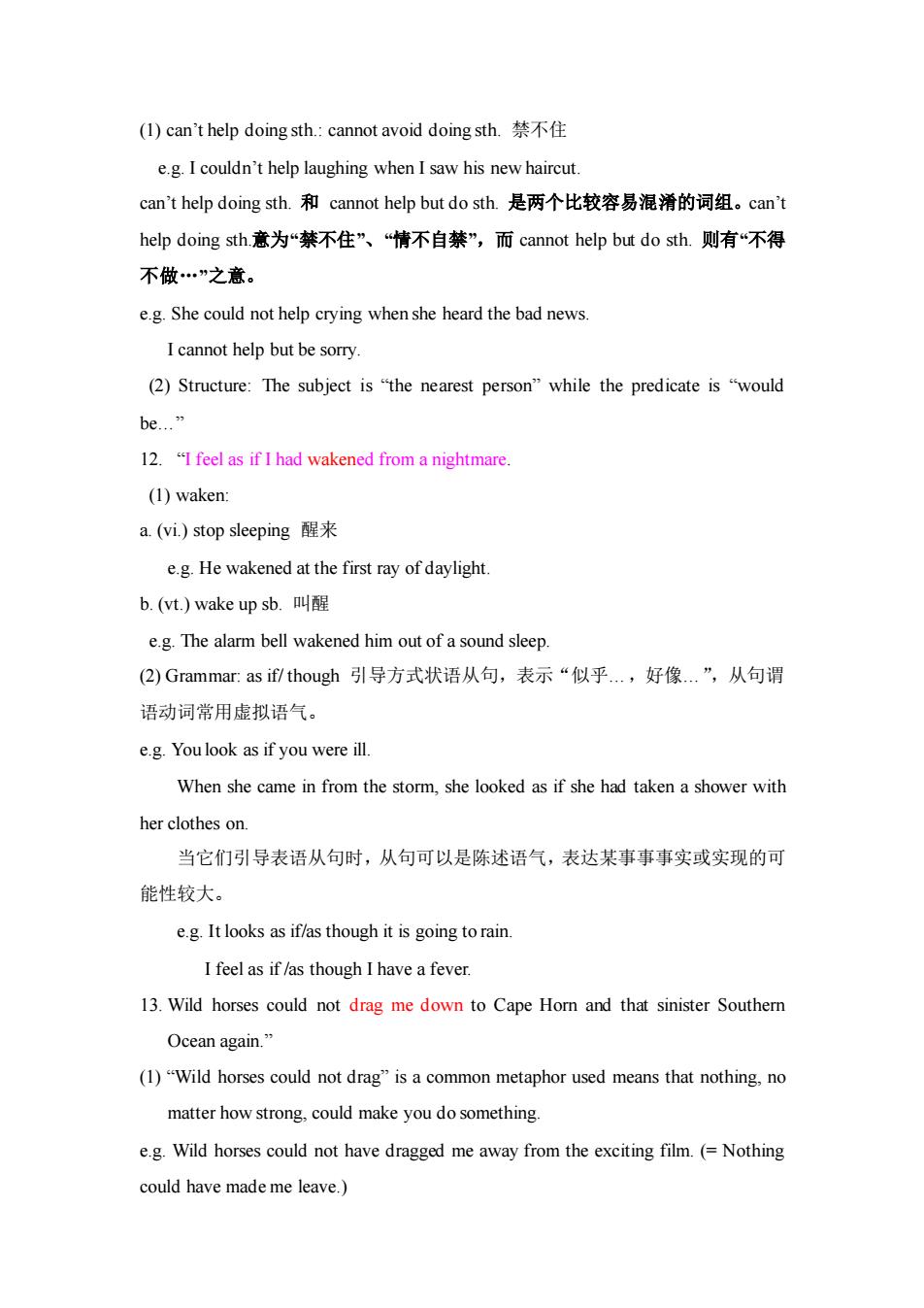
(I)can't help doing sth.:cannot avoid doing sth.禁不住 e.g.I couldn't help laughing when I saw his new haircut. can't help doing sth.和cannot help but dosth.是两个比较容易混淆的词组。can't help doing sth.意为“禁不住”、“情不自禁”,而cannot help but do sth.则有“不得 不做…”之意。 e.g.She could not help crying whenshe heard the bad news. I cannot help but be sorry. (2)Structure:The subject is "the nearest person"while the predicate is "would be..." 12."1feel as if I had wakened from a nightmare (1)waken: a.(vi,)stop sleeping醒来 e.g.He wakened at the first ray of daylight. b.(t)wake up sb.叫醒 e.g.The alarm bell wakened him out of a sound sleep. (2)Grammar:.as if/though引导方式状语从句,表示“似乎.,好像.”,从句谓 语动词常用虚拟语气。 e.g.You look as if you were ill. When she came in from the storm,she looked as if she had taken a shower with her clothes on. 当它们引导表语从句时,从句可以是陈述语气,表达某事事事实或实现的可 能性较大。 e.g.It looks as if/as though it is going to rain. I feel as if /as though I have a fever. 13.Wild horses could not drag me down to Cape Hom and that sinister Southem Ocean again." (1)"Wild horses could not drag"is a common metaphor used means that nothing,no matter how strong,could make you do something e.g.Wild horses could not have dragged me away from the exciting film.(=Nothing could have made me leave.)
(1) can’t help doing sth.: cannot avoid doing sth. 禁不住 e.g. I couldn’t help laughing when I saw his new haircut. can’t help doing sth. 和 cannot help but do sth. 是两个比较容易混淆的词组。can’t help doing sth.意为“禁不住”、“情不自禁”,而 cannot help but do sth. 则有“不得 不做…”之意。 e.g. She could not help crying when she heard the bad news. I cannot help but be sorry. (2) Structure: The subject is “the nearest person” while the predicate is “would be…” 12. “I feel as if I had wakened from a nightmare. (1) waken: a. (vi.) stop sleeping 醒来 e.g. He wakened at the first ray of daylight. b. (vt.) wake up sb. 叫醒 e.g. The alarm bell wakened him out of a sound sleep. (2) Grammar: as if/ though 引导方式状语从句,表示“似乎…,好像…”,从句谓 语动词常用虚拟语气。 e.g. You look as if you were ill. When she came in from the storm, she looked as if she had taken a shower with her clothes on. 当它们引导表语从句时,从句可以是陈述语气,表达某事事事实或实现的可 能性较大。 e.g. It looks as if/as though it is going to rain. I feel as if /as though I have a fever. 13. Wild horses could not drag me down to Cape Horn and that sinister Southern Ocean again.” (1) “Wild horses could not drag” is a common metaphor used means that nothing, no matter how strong, could make you do something. e.g. Wild horses could not have dragged me away from the exciting film. (= Nothing could have made me leave.)

(2)drag:pull along with difficulty拖拽 e.g.The capital prisoner was dragged from his cell. 14.It had taken him nine months,of which the sailing time was 226 days Grammar:.of which是介词加关系代词的情况,which指代“nine months' 15.Like many other adventurers,Chichester had experienced fear and conquered it. conquer:vi.defeat;win victory over;overcome e.g.The Normans conquered England in the 1th century. conquer,,beat&defeat这三个词都是动词,都有“打败”、“胜过”之意, conquer 指的是通过武力、斗争或坚强的意志把某事或某物、某人置于自己的控制之下。 e.g.The Spanish conquered the New World in the 16th century. beat 强调对手被彻底打败,该词常用在正式场合,可用于描写任何比赛。 e.g.Our army has never been beaten yet defeat 是应用范围很广的普通用语。意指打败敌人、对手,也可指在选举中落选,希 望、计划受挫等。 e.g.They hoped to defeat the enemy at sea. 16.In doing so,he had undoubtedly learnt something about himself. undoubtedly:adv.certainly无疑 e.g.English is undoubtedly one of the important courses in the university Step 4 Summary 1.Important words and phrases 2.Main idea of the text The article describes Francis Chichester's experience of sailing round the world. as well as his courage and determination in spite of many difficulties and attempts to prove human perseverance.People today can certainly learn a lot from him. Step5 Homework 1.Master the expressions and important sentences in the text 2.Review the text and finish the exercises on P31-39
(2) drag: pull along with difficulty 拖拽 e.g. The capital prisoner was dragged from his cell. 14. It had taken him nine months, of which the sailing time was 226 days. Grammar: of which 是介词加关系代词的情况,which 指代 “nine months”. 15. Like many other adventurers, Chichester had experienced fear and conquered it. conquer: vt. defeat; win victory over; overcome 征服 e.g. The Normans conquered England in the 11th century. conquer, beat & defeat 这三个词都是动词,都有“打败”、“胜过”之意。 conquer 指的是通过武力、斗争或坚强的意志把某事或某物、某人置于自己的控制之下。 e.g. The Spanish conquered the New World in the 16th century. beat 强调对手被彻底打败,该词常用在正式场合,可用于描写任何比赛。 e.g. Our army has never been beaten yet. defeat 是应用范围很广的普通用语。意指打败敌人、对手,也可指在选举中落选,希 望、计划受挫等。 e.g. They hoped to defeat the enemy at sea. 16. In doing so, he had undoubtedly learnt something about himself. undoubtedly: adv. certainly 无疑 e.g. English is undoubtedly one of the important courses in the university. Step 4 Summary 1. Important words and phrases 2. Main idea of the text The article describes Francis Chichester’s experience of sailing round the world, as well as his courage and determination in spite of many difficulties and attempts to prove human perseverance. People today can certainly learn a lot from him. Step5 Homework 1. Master the expressions and important sentences in the text 2. Review the text and finish the exercises on P31-39
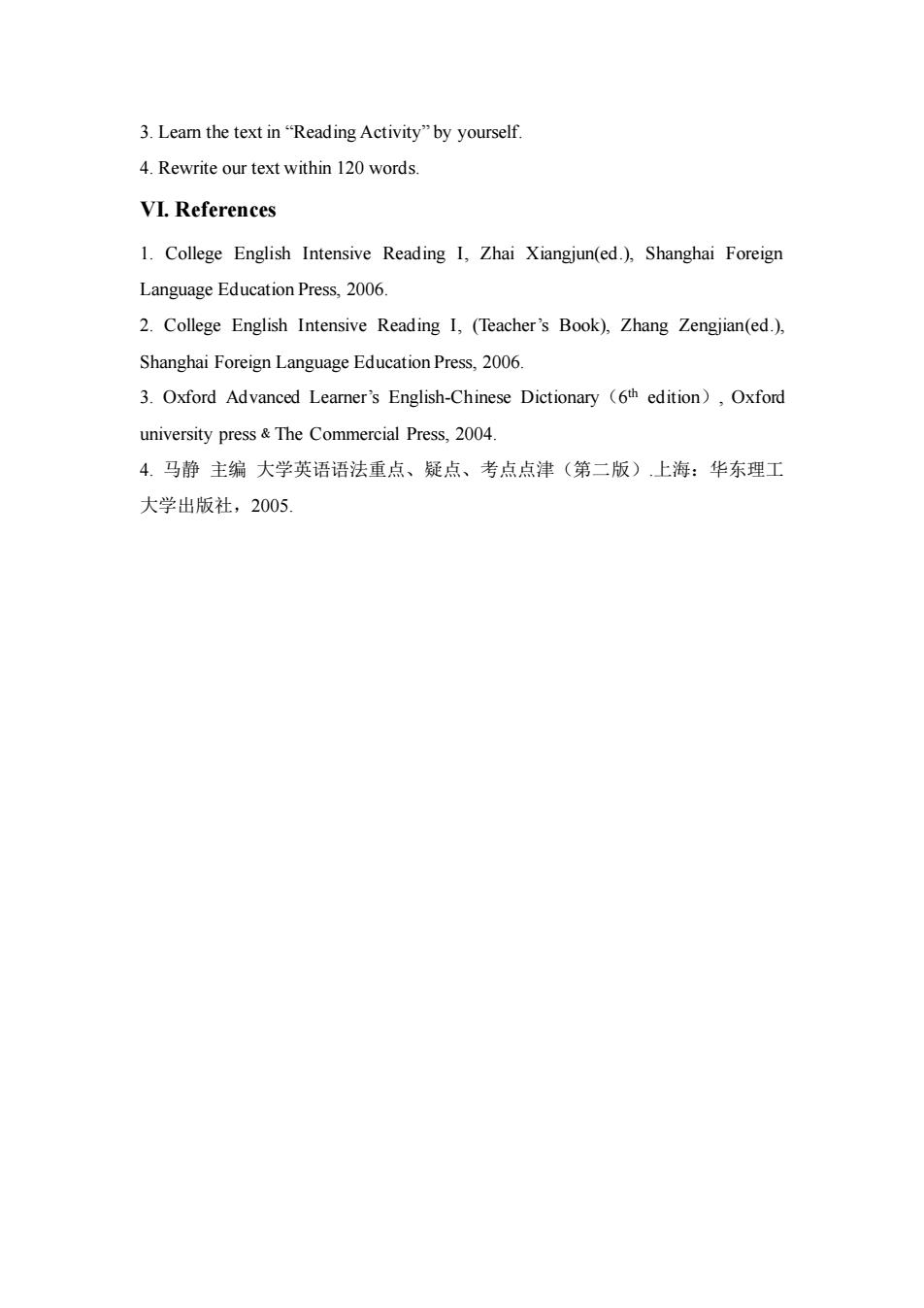
3.Leam the text in"Reading Activity"by yourself. 4.Rewrite our text within 120 words. VI.References 1.College English Intensive Reading I,Zhai Xiangjun(ed.),Shanghai Foreign Language Education Press,2006. 2.College English Intensive Reading I,(Teacher's Book),Zhang Zengjian(ed.) Shanghai Foreign Language Education Press,2006 3.Oxford Advanced Leamer's English-Chinese Dictionary (6th edition).Oxford university press &The Commercial Press,2004. 4.马静主编大学英语语法重点、疑点、考点点津(第二版).上海:华东理工 大学出版社,2005
3. Learn the text in “Reading Activity” by yourself. 4. Rewrite our text within 120 words. VI. References 1. College English Intensive Reading I, Zhai Xiangjun(ed.), Shanghai Foreign Language Education Press, 2006. 2. College English Intensive Reading I, (Teacher’s Book), Zhang Zengjian(ed.), Shanghai Foreign Language Education Press, 2006. 3. Oxford Advanced Learner’s English-Chinese Dictionary(6 th edition), Oxford university press﹠The Commercial Press, 2004. 4. 马静 主编 大学英语语法重点、疑点、考点点津(第二版).上海:华东理工 大学出版社,2005